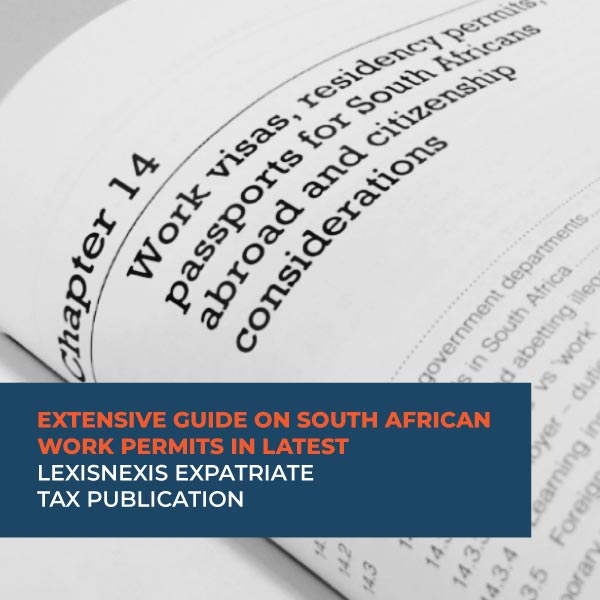EVENT | BRITISH CHAMBER LEXISNEXIS – EXPATRIATE TAX BOOK LAUNCH
/in Archived, Events, News /by xp-adminThe event will also include the launch of one of South Africa’s most important pieces of literature, the newly released LexisNexis title, Expatriate Tax: South African Citizens Working Abroad and Foreigners in South Africa, which is authored by Tax Consulting South Africa.
The guide was described by Judge DM Davis, perhaps the most esteemed tax expert on the Bench today, as “a carefully considered book which not only deals with all the various tax implications of immigration/emigration but even has space for a useful chapter on work permits.”
Leon Ayo, President of the British Chamber in South Africa, will be the event MC, while Jerry’s presentation will cover:
- The submission to parliament on behalf of South Africa expatriates
- The amended expatriate tax law
- Future planning opportunities for South African expatriates
- Practical examples of how to deal with SARS and manage tax risk
- Expatriate tax in South Africa
- Dealing with concerns surrounding South African citizenship
This is a must attend for all international taxpayers, expatriates, HR and financial managers, specialist tax advisors, financial managers, tax lecturers or scholars of tax.
Tax Consulting is the largest fully independent tax practice in South Africa with over 90 talented professionals, mostly admitted attorneys, chartered accountants, tax specialists and international mobility professionals. The work reflects their approach to taxation matters, which is holistic, technical and, above all, result-driven. They have an appetite for challenging and complex matters, where they seek to deliver the most tax efficient outcome to their clients, whilst being fully compliant.
The practice’s market position is reflective of a ‘modern tax suite’, where they often work for law firms, accountants or providers who require clinical execution. Their professionals deal with all areas of South African taxation including rebutting overly conservative external audit findings, SARS rulings, SARS disputes and litigation, SARS refunds and holding SARS to account for interest on delayed refunds, tax due diligences, Voluntary Disclosure Programme applications, fixing heritage tax matters left in disarray by previous tax advisors, as well as a the normal consulting and compliance services on corporate taxes, executive and employee taxes, high net worth families and businesses, international expansion or foreign groups into South Africa, VAT, customs and excise, as well as tax administrative law.

EXTENSIVE GUIDE ON SOUTH AFRICAN WORK PERMITS IN LATEST LEXISNEXIS EXPATRIATE TAX PUBLICATION
The first of its kind in South Africa, the title addresses the complexities of expatriate taxes from a South African perspective in a manner that speaks to both the tax specialist and the concerned taxpayer. Expatriate Tax provides a comprehensive, technical and practical guide to South African tax and deals with aspects of international mobility, including work visa strategies, citizenship, retirement funding, international remuneration, international share schemes, and exchange control considerations.
JOHANNESBURG (FULLY BOOKED)
WHEN: Wednesday, 30 October 2019 – 17:00 – 20:00
WHERE: Inanda Club, The Club House, Inanda, Sandton
CAPE TOWN (LIMITED TICKETS)
WHEN: Thursday, 7 November 2019 – 08:00 – 11:00
WHERE: The Brasserie at the Stack, Cape Town





